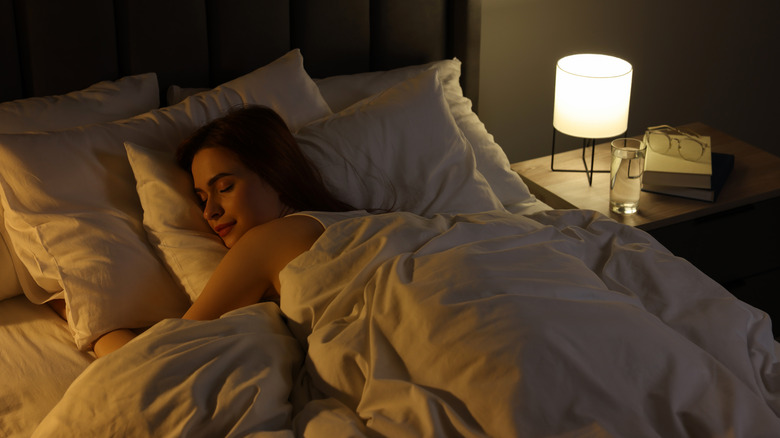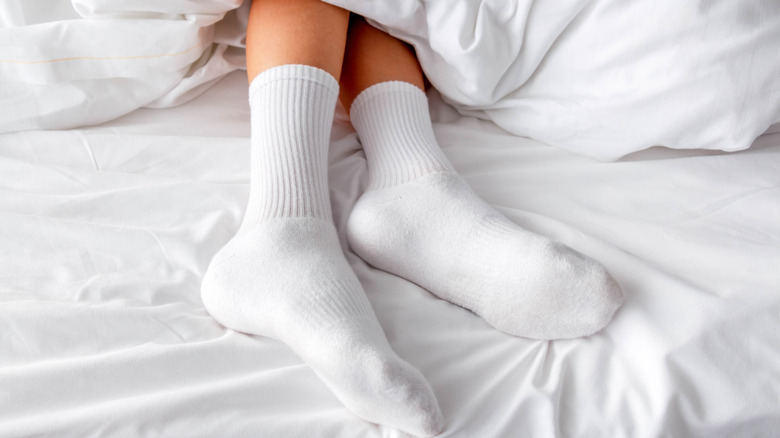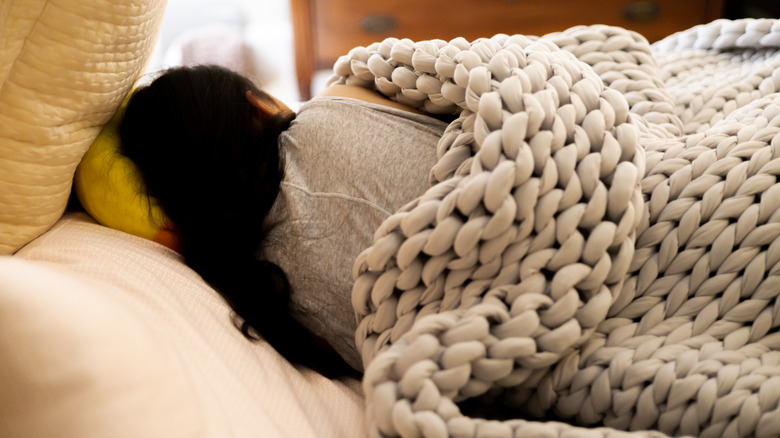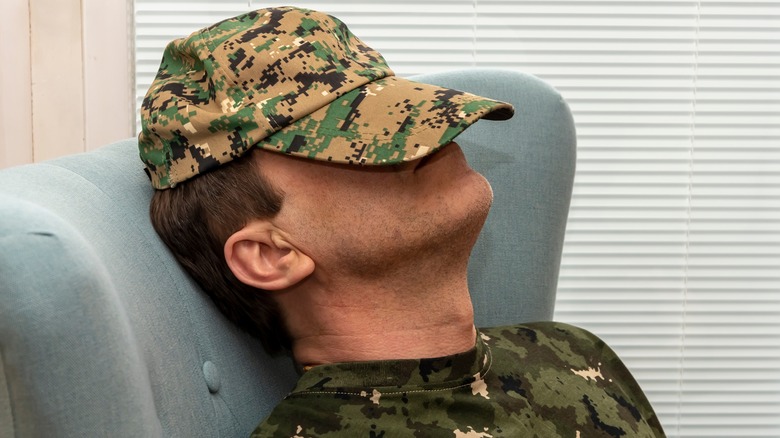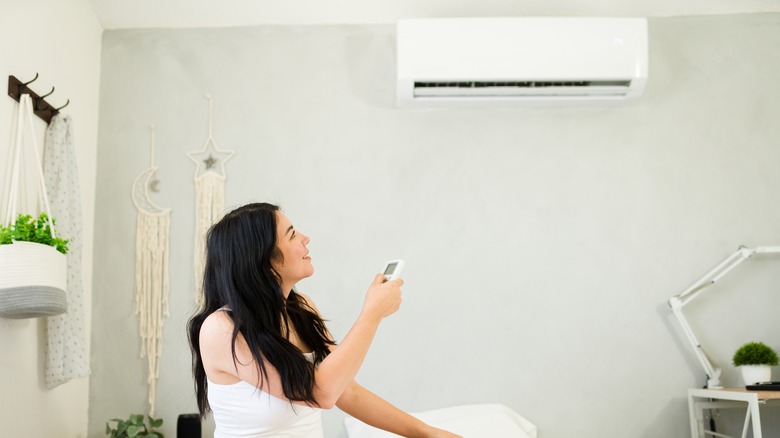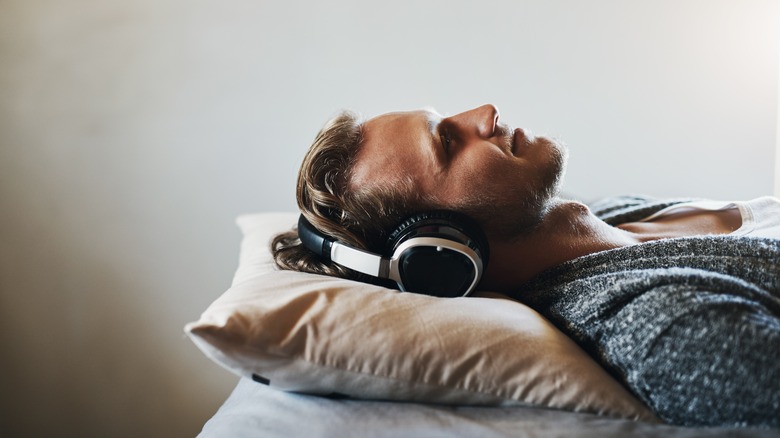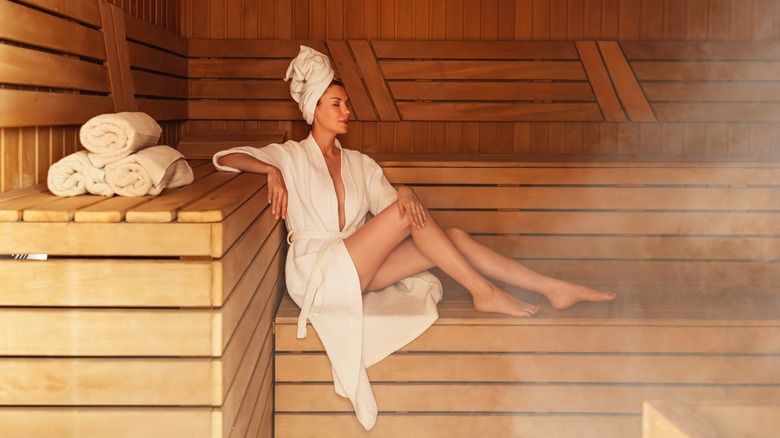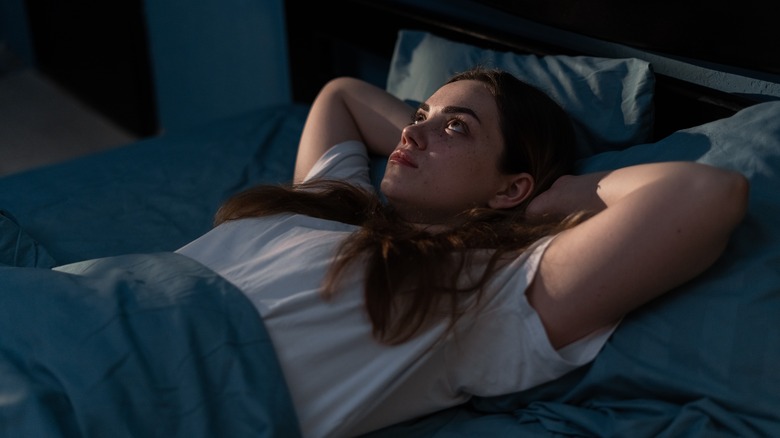Underrated Sleep Hacks That Will Have You Drifting Off In No Time
We may receive a commission on purchases made from links.
Getting a good night's sleep is important for a lot of reasons. Having a proper rest of anywhere between seven and nine hours can offer a number of health benefits, according to the Centers for Disease Control and Prevention. The health benefits of sleep include reduced stress, improved heart health, and a lowered risk of developing such conditions as type 2 diabetes, high blood pressure, and stroke.
However, for all of the good that sleep can do a body, the National Council on Aging reports that more than a third of Americans get less than seven hours of sleep. Additionally, 30% suffer from insomnia, with 10% reporting that their insomnia is severe enough to affect their day-to-day life. With these statistics in mind, the importance of sleeping well becomes very clear. But, if you are among that unlucky third of sleepless Americans, you might consider trying some of these sleep hacks that could help you hit the hay a little more quickly.
Try the 4-7-8 breathing method
Inspired by pranayama breathing techniques, the 4-7-8 method is a mindful breathing exercise designed to reduce stress and promote relaxation (via WebMD). The technique involves breathing in for four seconds, holding it for seven, and then exhaling for a count of eight. Employing this method before bed (or at any time when you're feeling stressed) can help decrease anxiety, lower blood pressure, and promote relaxation to help you get to sleep.
Part of why the 4-7-8 breathing method helps you get to sleep, according to the Cleveland Clinic, is because the counting allows you to take your mind off of whatever is distracting you and gives you something else to focus on. Additionally, it activates your parasympathetic nervous system, which is key to helping you settle into a calmer headspace. Additionally, the technique's ability to lower your heart rate and blood pressure can go a long way to helping you get your worries under control and drift off to sleep easily.
Use sleep inducing scents
According to a 2022 study published in Frontiers in Neural Circuits, sleep and smell are very much intertwined. The study showed that sleep can impact our sensitivity to smell and also store memories related to certain scents. Additionally, smells can impact the amount of time it takes for a person to fall asleep and also could determine how long he or she stays asleep.
Our body's olfactory system, which controls our sense of smell, is also connected to parts of the brain that regulate both sleep and our emotional processing (via Amerisleep). As such, aromatherapy can be a powerful tool in helping beat back insomnia and getting you to sleep. Using essential oils, diffusers, or even spraying your pillow with calming scents such as lavender can help let your body know that it's time to sleep and put you in a more restful frame of mind.
Wear socks to bed
Going to bed with cold feet can be enough to keep you awake on its own. But it's not just the feeling of discomfort that comes with frozen toes; there's also a medical reason behind your cold feet disrupting your slumber. According to the Cleveland Clinic, cold feet may cause your body temperature to rise as blood flows to warm them up. As a result, your body is unable to properly cool down, which disrupts your circadian rhythm.
Additionally, slipping on a pair of socks in bed could have other, more unexpected side benefits. Per Medical News Today, menopausal women may find that their hot flashes are somewhat allayed by wearing socks in bed. Hot flashes are caused by fluctuations in hormones that manage the body temperature. Given that wearing socks plays a role in lowering the core temperature, they could be helpful in combating those fluctuations.
Use a weighted blanket
Originally developed as a therapeutic tool to help people with sensory disorders and autism, weighted blankets have been gaining more mainstream traction in recent years (via UCLA Health). The compression offered by these blankets may help to regulate such body functions as heart rate, blood pressure, and even digestion. Additionally, weighted blankets may help reduce anxiety and help people fall asleep and stay asleep with greater ease.
According to a 2020 study published in the Journal of Clinical Sleep Medicine, patients who slept with a weighted blanket saw a sharp decline in the severity of their insomnia symptoms. In addition, they also saw improvements in depression and anxiety, much more so than patients in the group who slept with a lighter blanket. This finding is also significant, as it could mean that the positive effects of using a weighted blanket during the night can carry over into the daytime.
Try the military method
A technique designed to relax both the body and the mind, the Military Sleep Method can train a person to fall asleep within just a matter of minutes (via Choosing Therapy). The name comes from the fact that the technique is employed by soldiers who are accustomed to grabbing some shut-eye wherever and whenever they can. According to the University of Minnesota, the Military Method is almost a form of self-hypnosis and requires a little bit of practice to get right.
Choosing Therapy says that the Military Method is a six-step process that involves breathing deeply, relaxing the body from the shoulders down, and clearing the mind. Additionally, a person trying this method needs to focus on a two-word mantra: "Don't think." Repeating this over and over allows the mind to free itself from distractions and keep negative thoughts from creeping in and interrupting your sleep.
Cool down the room
When it comes to bedtime, the image that many people have in their heads is being snuggled up warm and toasty under the covers. However, too warm and too toasty might cut into your sleep time more than you'd like. According to the National Sleep Foundation, the ideal temperature to keep the bedroom is between 60 and 67 degrees. A cooler room can lower the body's core temperature and aid in the production of melatonin, all signals that it's time to go to sleep (via Healthnews).
Settling down for the night in a cooler environment can not only help you get to sleep faster, it can also promote a deeper, longer, and more restful night's sleep (via Sleepme). It can also help keep the body's hormones in balance, promoting immune function, cognitive function, and mood. Additionally, the colder temperature can give your metabolism a boost. Your body burns fat to generate heat while you sleep, and there are some indications that you could burn up to 100 extra calories daily just by sleeping in a cooler room.
Curate your own sleep soundtrack
Listening to music before bed can be a good way to shut down your brain and get you off to sleep faster. However, you want to be judicious about your song selection. According to UC Davis Health, music that has a tempo of around 60 beats per minute is ideal for calming your mind down and bringing about sleep. This number is ideal because it matches the body's resting heart rate. This theory was tested in a 2022 study published in Psychology of Music. In that study, participants listened to the song "Weightless" by Marconi Union, which begins at 60 beats per minute and slows down to 50 beats per minute by the end. The study showed that people who listened to the song had reduced stress and anxiety.
A 2021 study published in the Journal of the American Geriatrics Society showed that music can be an effective sleep aid for older adults as well. The study showed that older adults who listened to calming music at bedtime, versus more active or rhythmic music, led to improved sleep quality. The results also seemed to improve with listening to music over an extended period of time.
Hit the sauna
If you have the means to access a sauna (perhaps your local gym has one on the premises), it can be a useful tool in getting you relaxed and prepped for bed. A sauna session will raise your body temperature, and the subsequent cool-down will trigger a sleep response in your brain (via Amerisleep). The heat can also relieve aching muscles and joints, promoting relaxation and helping your body unwind for the night.
In general, saunas are overall good for one's health, as evidenced by a 2015 study published in JAMA Internal Medicine, which showed that men in Finland who used saunas at least four times a week for 20 minutes showed a 63% decrease in their risk of cardiac death. Additionally, a 2017 study published in Age and Ageing showed that men who used a sauna anywhere from four to seven times a week saw their risk of developing Alzheimer's and dementia decrease by more than half.
Drink tart cherry juice
The health benefits of tart cherry juice have been well documented (via WebMD). It's been lauded for everything from its antioxidant and anti-inflammatory benefits to its ability to help the body recover after exercise. However, it may also be an effective sleep aid as well. Tart cherry juice can help the production of tryptophan in the body, which also promotes the production of melatonin.
According to the Sleep Foundation, for every 100 grams of tart cherries, you get approximately 9 milligrams of tryptophan. As such, a glass of cherry juice an hour or so before bed, especially when combined with other sleep-promoting foods, can be beneficial in setting yourself up for a good night's rest. A 2018 study published in the American Journal of Therapeutics showed that people with insomnia who drank tart cherry juice saw their sleep time increase by more than 80%. In addition, their tryptophan production was increased and inflammation was reduced.
Try reverse psychology
People who can't fall asleep can try to employ a little reverse psychology on their brains, tricking it into falling asleep by forcing it to stay awake. According to Somnology, this technique is known as "paradoxical intention," a cognitive behavioral therapy technique that can be used to treat insomnia. The technique involves flipping the script when suffering from insomnia. Instead of focusing on how you can't sleep, you switch things up and try your hardest to stay awake.
The reason that paradoxical intention works, per Sleepopolis, is because it removes the anxiety that comes from stressing over whether or not we will fall asleep. When the focus shifts to trying to stay awake, the stress of not sleeping is reduced and the body can relax more quickly. Additionally, Psychology Today reports that paradoxical intention could be helpful when dealing with other conditions, such as OCD, anxiety disorders, and certain phobias.
